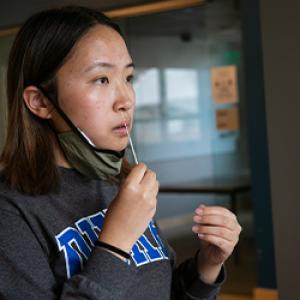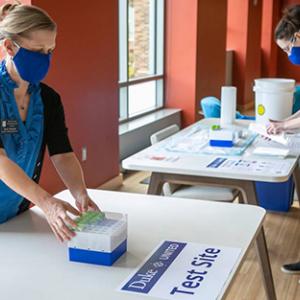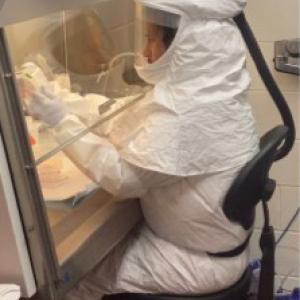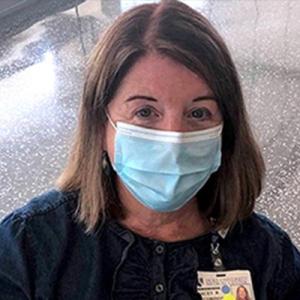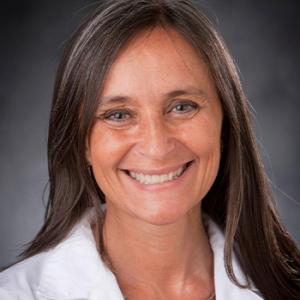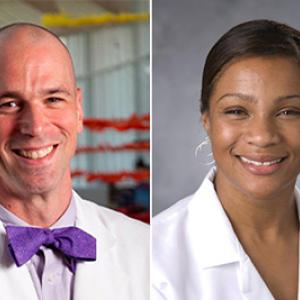COVID tested the resilience of Duke's research
Like nearly all other aspects of life, the normal routines of Duke research labs came to a grinding halt due to COVID-19. Duke researchers shared their reflections on the struggles and insights the process of research shutdown and reboot has had within their labs during a Virtual Research Town Hall on Thursday, September 3rd.
Anxious and depressed? Experts share tips for coping in a pandemic
COVID-19 has stripped control and predictability from us. We can’t do the things we want, and we aren’t sure when this mess is going to end.
So we’re anxious and depressed and overwhelmed. Many of us are trying to work and parent and keep households running. Many of us are “essential,” which means we have to work in public, putting our health at risk.
It’s a lot to deal with, but there are ways to cope, help others, and shepherd our kids to the other side of all of this.
Meet the team powering Duke's COVID-19 surveillance testing efforts
Students returning to Duke University are participating in surveillance testing to help rapidly identify and isolate people who may have contracted the COVID-19 virus. This is done using pool testing, which combines nasal samples from five people for a single test to allow more testing using fewer resources. If a pooled test comes back positive, each student in that sample will be tested individually to identify who has contracted the virus and follow through with any isolation procedures.
Keeping a close watch on COVID-19 with surveillance tests
This article was first published in Duke Today
Duke Associate Professor of Biology Steve Haase likes to compare the spread of COVID-19 to the haphazard advance of a forest fire, where tiny glowing embers, which he likens to the virus, drift in the air, among trees bringing potential harm whatever they touch.
Stacy McCorison: Dedicated Devil rising to the challenge during COVID-19
As we face the challenges brought on by the coronavirus pandemic, Duke staff and faculty everywhere are stepping up to keep the important work of the university and health system going. In an effort to highlight contributions, we've started a new feature, "Dedicated Devils."
Getting important health information to local Latinx communities
Dr. Viviana Martinez-Bianchi has long been focused on health equity. When the coronavirus pandemic struck, she turned to the local community, helping launch an effort to get better information in the hands of area Hispanic residents.
Together with her pediatrician colleague Gabriela Maradiaga Panayotti, Martinez-Bianchi launched a campaign called Latin-19 in March to help educate North Carolina’s Latinx communities about COVID-19.
Duke and Chapel Hill-Carrboro City Schools partner to make data-driven decisions on schooling during COVID-19
A multi-disciplinary scientific advisory board will provide rapid readouts of data on epidemiology, infection transmission rates, and other research. The pilot project, which is funded by the NIH, creates a model with potential to expand to additional school districts across the nation.
The Chapel Hill-Carrboro City Schools (CHCCS) Board of Education announced Thursday evening at its meeting a new partnership with the Duke University School of Medicine that will enable informed decision-making and implementation of district procedures in response to COVID-19.
Experts urge empathetic approach to convincing mask opponents
As the 2020 freedom-vs-facemask culture war rages on in America’s social media feeds and grocery store checkout aisles, a panel of Duke experts suggests an empathetic, non-adversarial approach to get more people to cover up.
The advice came during a weekly media briefing Wednesday featuring three Duke professors who took questions from reporters regarding the challenges of public health messaging.
Here are excerpts:
Why COVID-19 is exposing health disparities
Two Duke doctors discuss reasons, possible solutions in media briefing
COVID-19 has shone a stark light on America’s economic and racial health disparities, proving there is no one-size-fits-all strategy to test and treat people for the disease, two Duke experts emphasized Thursday.
The pandemic has illuminated the struggles minority populations have in obtaining good information, getting tested and finding help when infected. But there are ways to improve the situation, the two health experts said.


